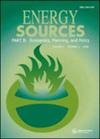技术进口方式、环境规制类型与全要素能效
IF 2.2
4区 工程技术
Q3 ENERGY & FUELS
Energy Sources Part B-Economics Planning and Policy
Pub Date : 2022-11-13
DOI:10.1080/15567249.2022.2141374
引用次数: 1
摘要
本文利用2008 - 2019年中国30个省份的数据,研究了不同技术进口模式对环境法规与全要素能源效率关系的中介作用。基于波特假设,本研究揭示了不同的技术进口模式可以被不同的环境管制类型驱动,包括命令控制型环境管制(CCER)和市场激励型环境管制(MIER),它们对TFEE有不同的影响。通过将技术引进与外国技术引进区分开来,结果表明,CCER和MIER诱导企业高管关注外国技术引进,导致企业自主创新乏力,进而削弱企业自主创新能力。MIER将企业高管的注意力转移到IOFT上,激励他们关注再创新,有利于提高TFEE。此外,本研究发现技术吸收能力(TAC)可以减弱POFT与TFEE之间的负向关系,并增强IOFT对TFEE的正向作用。研究揭示了不同的技术引进方式和环境规制方式对TFEE的影响。它还揭示了在技术进口的背景下,技术咨询在提高技术费用方面的调节作用。它为环境规制类型对绿色发展的影响提供了一个新的对话视角,并通过将缺失的技术进口因素纳入理论,为波特假设文献做出了贡献,并提供了管理和政策启示。本文章由计算机程序翻译,如有差异,请以英文原文为准。
Technology import modes, environmental regulation types and total factor energy efficiency
ABSTRACT This paper examines the mediating roles of different modes of technology import on the relationship between environmental regulations (ERs) and total factor energy efficiency (TFEE) by using the data of 30 provinces of China from 2008 to 2019. Based on the Porter hypothesis, this work reveals that different modes of technology import can be driven by different environmental regulation types, including command-control environmental regulation (CCER) and market-incentive environmental regulation (MIER), which have different impacts on TFEE. By distinguishing technology imports into the purchases of foreign technology (POFT) and the imitations of foreign technology (IOFT), the results show that CCER and MIER induce corporate executives to focus on POFT, resulting in sluggishness in self-innovation and accordingly undermining TFEE. The MIER shifts corporate executives’ attention on IOFT, inspiring them to focus on re-innovation, and is beneficial for improving TFEE. Additionally, this research finds that technology absorption capacity (TAC) can blunt the negative relationship between POFT and TFEE, as well as strengthen IOFT’s positive effect on TFEE. This research unearths the roles of different technology import modes and environmental regulation modes on TFEE. It also uncovers the role of TAC as a moderator for improving TFEE within the context of technology import. It offers a new dialogue perspective about the effects of environmental regulation types on green development, and contributes to the porter hypothesis literature by incorporating the missing technology import factors into the theory, and also provides managerial and policy implications.
求助全文
通过发布文献求助,成功后即可免费获取论文全文。
去求助
来源期刊

Energy Sources Part B-Economics Planning and Policy
ENERGY & FUELS-
CiteScore
6.80
自引率
12.80%
发文量
42
审稿时长
6-12 weeks
期刊介绍:
12 issues per year
Abstracted and/or indexed in: Applied Science & Technology Index; API Abstracts/Literature; Automatic Subject Index Citation; BIOSIS Previews; Cabell’s Directory of Publishing Opportunities in Economics and Finance; Chemical Abstracts; CSA Aquatic Science & Fisheries Abstracts; CSA Environmental Sciences & Pollution Management Database; CSA Pollution Abstracts; Current Contents/Engineering, Technology & Applied Sciences; Directory of Industry Data Sources; Economic Abstracts; Electrical and Electronics Abstracts; Energy Information Abstracts; Energy Research Abstracts; Engineering Index Monthly; Environmental Abstracts; Environmental Periodicals Bibliography (EPB); International Abstracts in Operations Research; Operations/Research/Management Science Abstracts; Petroleum Abstracts; Physikalische Berichte; and Science Citation Index.
Taylor & Francis make every effort to ensure the accuracy of all the information (the "Content") contained in our publications. However, Taylor & Francis, our agents, and our licensors make no representations or warranties whatsoever as to the accuracy, completeness, or suitability for any purpose of the Content. Any opinions and views expressed in this publication are the opinions and views of the authors, and are not the views of or endorsed by Taylor & Francis. The accuracy of the Content should not be relied upon and should be independently verified with primary sources of information. Taylor & Francis shall not be liable for any losses, actions, claims, proceedings, demands, costs, expenses, damages, and other liabilities whatsoever or howsoever caused arising directly or indirectly in connection with, in relation to, or arising out of the use of the Content. Terms & Conditions of access and use can be found at http://www.tandfonline.com/page/terms-and-conditions .
 求助内容:
求助内容: 应助结果提醒方式:
应助结果提醒方式:


